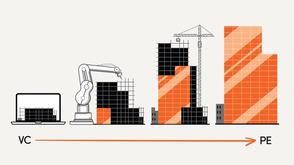Meet NEO, the Humanoid Ushering In The Age of The Home Robot – Backed By EQT


EQT-backed 1X is launching NEO, a household humanoid that aims to transform how humans live. NEO is designed to handle domestic chores, freeing up time so people can focus on family and work.
- EQT-backed 1X has launched humanoid robot NEO to do household chores.
Growing up in Norway, Bernt Børnich was fascinated with humanoid robots and science fiction. Today he’s turning his childhood dreams into reality. Børnich’s company, 1X, is rolling out a novel line of robots that can clean, fold clothes, water the plants and carry out other mundane household tasks, freeing up valuable personal time.
On day one, the 5-foot-6 (168cm), 66-pound robots will be able to open the door for guests, retrieve items, turn off the lights at night and perform other basic tasks. But NEO, which 1X says is the first of its kind, will continue to learn and develop new capabilities as it gains more data. The upshot: increased productivity and more time with family and friends.
Powered by AI, the robots launched by EQT-backed 1X can listen and respond when appropriate, lift items weighing up to 154 pounds and recall previous context, operating more quietly than a refrigerator. The U.S.-based company plans to start delivering NEOs to customers in its home market in 2026, before expanding to other countries.
The company hopes that these robots, which feature human-level hand dexterity and tendon-driven mechanisms inspired by the human musculoskeletal system, could have a wider impact, helping society care for an aging population and solve labor challenges, in addition to assisting people in completing tasks at home.
“These robots promise something greater than just the ability to solve the problems of today,” Børnich said in a TED Talk earlier this year. “They can give us back things like time.”

Learning through experience
1X decided to roll out robots that can learn on the job and gain a diverse array of data in the home, rather than try and create a machine that owners assume can do anything, said Ted Persson, Partner and lead investor, EQT Ventures.
“The key to success is data. When you look at autonomous vehicles, Tesla and Waymo are the only survivors and that is because they collected and analyzed data from day one,” Persson says. The data being collected from each NEO will lead to real-time upgrades and enhancements to their capabilities.”
Over time, each NEO will know their owner’s preferences, for example, where specific items should be put in a house, while at the same time refine its ability to do certain tasks, like how to open a drawer correctly.
Persson sees a future where NEO and its derivatives move beyond the home into hospitals, care homes, and restaurants. They will be especially valued in countries with aging demographics like China, Japan, and much of Europe.
Productivity Boost
By saving people from having to spend hours each week tidying their homes, such robots promise to be a potential productivity booster. When analyzing the potential for robots in the workplace, investment bank Morgan Stanley calculated that a $50,000 robot saves the user at least $500,000 over 20 years compared to a low-wage worker. The end result is estimated to be a total addressable market that could end somewhere in the multi-trillions of dollars, according to some Wall Street predictions.
1X’s new robot is the latest gizmo that is designed to help save owners valuable time and money. Among big name firms, Amazon has been using the Proteus robot, a low-to-the-ground wheeled vehicle that picks up and moves containers full of items in its warehouses. The firm has also been testing a bipedal humanoid robot called Digit in partnership with Agility Robotics.
Other firms in this space include Vsim, a UK-based company also backed by EQT Ventures, which develops simulation technology and software solutions for robotics that help AI agents solve complex tasks, as well as Figure AI and Unitree Robotics.
For Børnich, NEO is sci-fi come true. "With the launch of NEO, humanoid robots become a product. Something that you and I can reach out and touch,” he says.
“NEO closes the gap between our imaginations and the world we live in, to the point where we can actually ask a humanoid robot for help, and help is granted."
James Paton is a senior editor contributing to ThinQ by EQT. Previously he has been an editor for Bloomberg focusing on healthcare and industrial news.
Benjamin Robertson is an Editor for ThinQ by EQT focusing on capital markets and private equity. Before joining ThinQ he was a journalist for Bloomberg and the South China Morning Post.
ThinQ by EQT: A publication where private markets meet open minds. Join the conversation – [email protected]
Exclusive News and Insights Every Week
Sign up to subscribe to the EQT newsletter.






